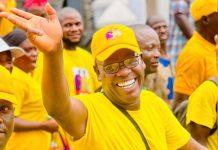The power of technology and fashion have combined in a thought-provoking project that demonstrates how data can transform African cities. Tech leader Siemens (www.Siemens.com) used data from the cities of Lagos, Nairobi and Johannesburg and wove it into unique fabrics which tell a story about each city. Three iconic African fashion designers then used the fabrics to create one-of-kind outfits, which are as stylish as they are smart!
FABRIC – launched in Johannesburg on 23 August – showcases how digitalization of the industrial world is fast becoming the biggest transformation of our time, and highlights how data combined with smart technology will ensure that tomorrow’s cities are more connected, efficient and powered.
Three iconic African fashion designers were brought on board to create 12 extraordinary outfits from vast amounts of data extracted from the cities of Nairobi, Lagos and Johannesburg. The intricate garments by John Kaveke (Kenyan), Zizi Cardow (Nigerian) and Palesa Mokubung (South African) outline a variety of patterns from power grids, shipping and tonnage to population densities, transport and areas of connectivity. Data from each of these sectors tell a powerful story about each city and how digitalization can transform them. All of this is told through the universal language of fashion and design.
“This is how we thought to express the aspect of digitalization. As urbanization rapidly increases, cities need to start preparing for the effects it will have on infrastructure, energy, water and transportation systems,” said Keshin Govender, Group Communications Head for Siemens South Africa.
Data gives greater insight on what makes each city tick, helping us make calculated decisions and improve service delivery to the people. Through the FABRIC project, it was evident that the challenge is not what to do with the avalanche of data but rather accessing reliable and recent data.
“This project has highlighted the need for access to data in order to make sound urban planning decisions,” explained Govender.
Siemens is well positioned in automation, electrification and digitalization to find solutions to the various challenges of today. It is uniquely positioned to unlock the potential of digitalization through its combination of digital expertise, domain know-how and understanding of hardware in order to leverage digital technologies and optimize operations.
While there is a growing adoption of intelligent machines within certain sectors like the automotive industry, the real opportunity for Africa lies in sectors where it has not yet been explored like manufacturing, energy and transportation. This is a remarkable opportunity for Africa which will result in the establishment of new industries and new jobs, while exponentially increasing skills development and contributing to GDP.
Siemens AG (Berlin and Munich) (www.Siemens.com) is a global technology powerhouse that has stood for engineering excellence, innovation, quality, reliability and internationality for 170 years. The company is active around the globe, focusing on the areas of electrification, automation and digitalization. One of the world’s largest producers of energy-efficient, resource-saving technologies, Siemens is a leading supplier of efficient power generation and power transmission solutions and a pioneer in infrastructure solutions as well as automation, drive and software solutions for industry. With its publicly listed subsidiary Siemens Healthineers AG, the company is also a leading provider of medical imaging equipment – such as computed tomography and magnetic resonance imaging systems – and a leader in laboratory diagnostics as well as clinical IT. In fiscal 2017, which ended on September 30, 2017, Siemens generated revenue of €83.0 billion and net income of €6.2 billion. At the end of September 2017, the company had around 377,000 employees worldwide. Further information is available on the Internet at www.Siemens.com.
Notes from designers:
Johannesburg-based Palesa Mokubung said this project had transformed her thinking. “It opened so many new elements of inspiration, it’s like I am only truly experiencing Johannesburg right now. I see Johannesburg as more dynamic with hidden opportunities underneath highways, pipes and houses. I’m forever changed when it comes to what I do and how I see the city.”
Nairobi-born John Kaveke said there was no better way to tell the story than through fashion.
“Fashion and technology are a universal language and the two combined create a formidable team,” he said.
Lagos-based Zizi Cardow said: “It’s time Africa equipped itself with information. Africa is often overlooked in terms of technology and science so pushing forward on these incredibly important aspects is the next step to propel the continent. Having more data about Africa means understanding our nations better and equipping ourselves to solve the problems we face.”
SOURCE
Siemens AG



























